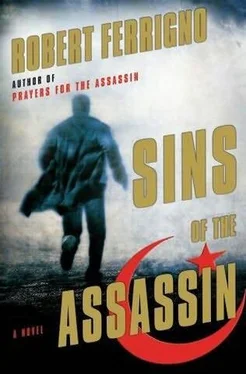“I’m armed and dangerous, sweetie, so you go do what you have to,” said Baby, still smoothing Moseby’s hair. The top two buttons of her blouse had come undone and Rakkim could see a tiny birthmark between her breasts. She looked up and caught him staring. It didn’t seem to bother her.
“You should go to the bunker, Baby,” said the Colonel.
“What kind of Christian would I be if I did that? God hates a coward. You scoot now.”
“What’s happening?” Rakkim asked the Colonel.
“I hoped Alpha Company might get back before morning, but the bridge over the Hatchie was dynamited a few hours ago. Next crossing is forty miles of bad road in the wrong direction, so no reinforcements until tomorrow. Looks like we’re on our own.” The Colonel’s expression turned wistful. “Wish that Moseby had found that canister a few days sooner. Lord knows what’s inside that thing-I’ve heard stories about black-ice projects on impenetrable force fields and sound waves that throw men into a panic. Be nice to have something like that right about now.” He straightened his shoulders. “Guess we’ll have to kick ass the old-fashioned way.”
“Old-fashioned works just fine for me,” Baby said softly.
The Colonel kissed her. He glanced at Leo bent over the canister and shook his head. The door closed after him.
Through the window, Rakkim saw the Colonel give orders to the guards outside. He got down beside Leo. “Can I help?”
“Yeah, try not making me laugh with dumb questions,” said Leo, eyes half closed. “It’s distracting.”
Rakkim stayed on the floor, watching Baby hold Moseby’s hand. He touched his own ear link. The Colonel’s officers used a dedicated frequency, but their links had lousy security filters compared to the Swiss link he had.
“…this is Tiger Six, I want your men dug in along the west ridge,” said the Colonel, “and tell the miners to soldier up. We’re going to need every one of them.”
“Affirmative.”
“Scout team D missed their check-in…”
Rakkim drifted along on the com links, heard nervousness among the buzzing voices. Nothing worse for a soldier than being hunkered down, waiting to be attacked. No idea where the assault would be launched, or how many of the enemy there were. The young ones pretended to be tough, cursing and watching their comrades out of the corner of their eye, looking for a reflection of their own fear. Old warriors dozed before a coming battle, or took a last, comfortable crap.
“There we go,” said Leo, grinning, eyes wide. His fingers danced over the buttons on the end of the canister, and there was a hissing sound as if pressure was being released. He unscrewed the top as easy as if it were a pop bottle.
Rakkim leaned in closer.
Leo reached into the cylinder, pulled out a clear, insulated pack filled with computer cores. He set them carefully down, reached farther in. Finally tipped the cylinder so that a long, rectangular box slid onto the floor with a thunk. Dinged the wood floor, it was so heavy. The box was sealed with lead and stenciled with various official Defense Department seals and the same number marked on the outside of the canister: 72/106. Leo looked at the box and went back to the computer cores.
“That’s it?” said Baby.
Leo opened the insulated pack, gently pulled out the first computer core. He placed his fingers on the download inputs and closed his eyes. He breathed heavily now, laboring at something. His eyes darted back and forth under his closed lids.
“Leo?” said Rakkim.
Leo sat frozen, head twisted at an odd angle, barely breathing now.
“Something wrong with him?” said Baby. “Looks like he’s thrown a fit.”
“He’s just…thinking,” said Rakkim.
“How long is he going to sit there thinking?” said Baby.
Rakkim shook his head.
“I can’t tell if he’s smart or slow,” said Baby. “Seems to me if the Russians want to pay billions of dollars for that weapon thing, they could have hired somebody who does more than sit there and drool.”
Ten minutes later, Leo opened his eyes. Picked up another computer core.
“You want to talk?” said Rakkim.
Leo moved his jaw a few times. Probably grinding his teeth while he was…gone.
“Is it working?” Rakkim shook him. “Leo?”
Leo stared at him.
“Leo! Are you in?”
Leo slowly nodded. “Tenth…tenth-gen security hash logarithm, but I am in…in like sin,” he whispered. “Massive gamma radiation…far beyond anything the Tether program anticipated,” he said, voice trailing off. He was in there somewhere, but not anyplace Rakkim could reach.
Rakkim watched him go through five more of the cores, no longer responding to questions from Rakkim or Baby. Not responding to anything outside the interface. It was getting dark now, the ear-link chatter more frequent.
“Go on, Rikki,” said Baby. “I can tell when a man’s restless. Can’t blame you either. Leo’s a sweet boy and all, but I sure don’t see him doing any honest work.”
Rakkim got up and bent down beside Moseby, placed a hand on his cheek. “Hey, John, how are you doing?”
Moseby didn’t respond but his breathing held steady and his skin was warmer.
“Go shoot somebody, handsome, I got things under control here,” said Baby. “Go. I been taking care of sick men my whole life.”
Rakkim said good-bye to Leo, but got no response.
Bartholomew finished his morning prayers, carefully rolled his prayer rug, and placed it in his cubby. His position had been slightly off during his devotions, his spine not perfectly straight. He begged Allah to forgive such sloppiness. The most minute error could have catastrophic consequences, that was both his professional and personal creed.
Through the window of his office, he could see Frank, his personal secretary, waiting patiently for him to compose himself before knocking. A slender, beardless modern with a too-ready laugh, Frank had been a difficult hire. Most of the other inspectors refused to work with moderns, viewing that as un-Islamic and unclean. Let him go to work making pornography or serving beer in the Zone, his colleague Nicolas had said after they finished the interview. It had been two years since Bartholomew hired the modern. Two years and Nicolas still refused to go to mosque with him, but Bartholomew knew what he was doing.
When an opening in the elite security detail was announced, Bartholomew was the one who got the promotion. He was not so arrogant as to believe his new duties were solely the result of his superior test scores and performance evaluations, though he ranked in the upper 1 percent of certified aircraft inspectors. The president surrounded himself with moderate Muslims, moderates not just in dress or demeanor, but in behavior as well. Hiring Frank was considered a clear sign of Bartholomew’s charity and tolerance; he was just the sort of professional the presidential staff trusted and wished to encourage.
Bartholomew checked his reflection in the glass. He smoothed his hair. Picked a minute spot of lint off the lapel of his black suit. The bows in his knotted shoelaces were the exact same size and length. He finally beckoned to Frank, acknowledged the gratitude in the modern’s eager face.
Come the change Bartholomew would have the apostate beheaded.
The Colonel’s base camp was perched on a scraggly, rocky plateau midway up the mountain. It should have been easy to defend except there were too many access points from the valley below-two-lane logging roads from the north, a series of gravel paths from the south, and dozens of trails cut through the surrounding trees along the western perimeter. While a mechanized force would be limited to attacking from the north, lightly armed men like Crews’s End-Timers could assault the camp from the south and east as well. Holding the high ground was still an advantage, but if the End-Timers were willing to ignore their mounting casualties and keep coming…
Читать дальше












